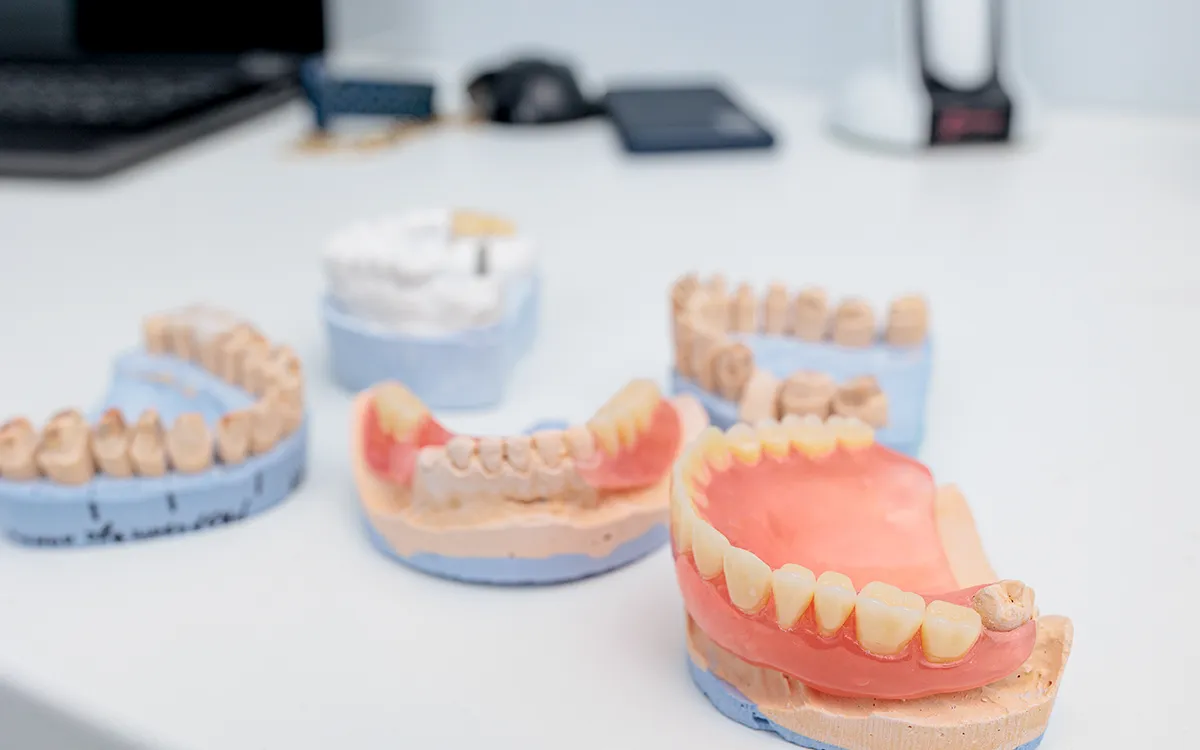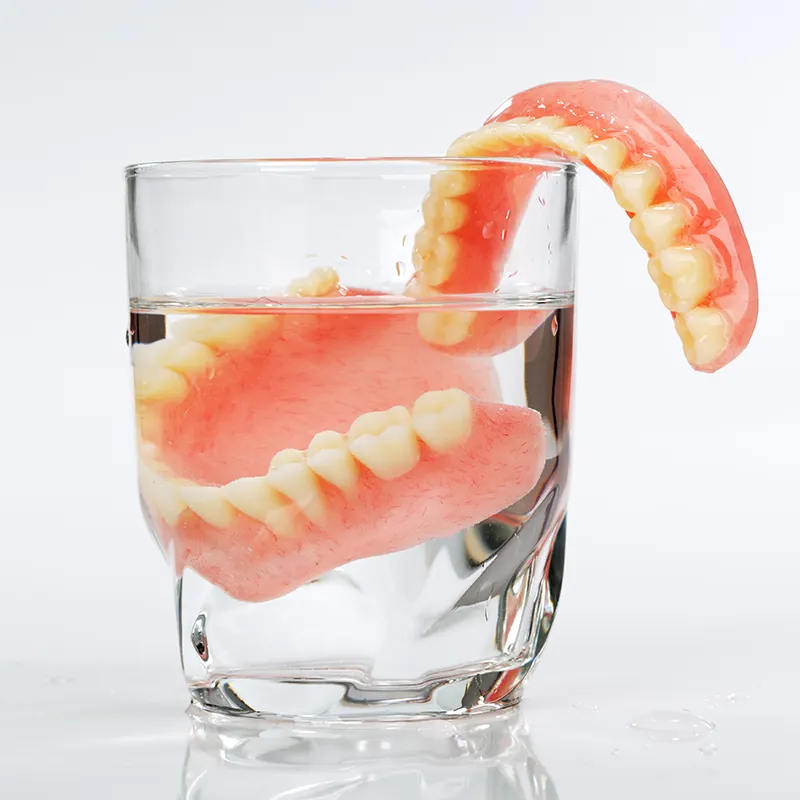How to simply minimise denture discomfort
Long-term denture use challenges
Restoring your smile and improving daily function after tooth loss can be effectively achieved with dentures. However, wearing them over an extended period can lead to certain changes in your oral health. It’s important to be aware of these potential effects so that you can manage and prevent them:

Bone loss: Your jawbone depends on stimulation from natural teeth to maintain its density and shape. Without teeth, the bone may gradually shrink, a process called bone resorption. This affects the fit of your dentures and can also change the contours of your face over time, leading to a sunken appearance.
Soft tissue changes: The gums and soft tissues that support your dentures may thin out as you age or become irritated with continuous pressure. This can cause discomfort and lead to the need for adjustments in the fit of your dentures, as they may no longer sit as securely.
Oral hygiene concerns: Just like natural teeth, dentures can accumulate plaque and bacteria. If not properly cleaned, this buildup can lead to gum inflammation, infections, and a higher risk of gum disease. Additionally, improper cleaning of dentures themselves can result in staining and unpleasant odours.
Denture fit issues: As bone loss and soft tissue changes occur, the fit of your dentures can become looser or less comfortable. This can cause difficulties with speaking, chewing, and even lead to sore spots or irritation in your mouth.
Increased risk of oral infections: Long-term denture wearers may be at a higher risk for conditions like denture stomatitis—a fungal infection that can develop under the denture, particularly if proper cleaning is neglected. Regular checkups with your dentist are important to identify any early signs of such infections.
Key steps to healthy denture use
Avoid potential issues by taking proactive steps to care for your dentures and oral health. This is your simple path to enjoying a comfortable, healthy smile for the longest time. Consider whether you are on-track with these practical tips to minimise the long-term effects of wearing dentures:
Prioritise regular cleaning
Consistent cleaning of your dentures and mouth is essential for excellent oral hygiene. Here’s a simple daily routine to help prevent plaque and bacterial buildup:
- After meals, remove your dentures and rinse them to eliminate food particles.
- Use a soft-bristled brush and a non-abrasive denture cleanser to brush your dentures—avoid toothpaste as it can be too abrasive.
- Soak your dentures overnight in a denture-cleaning solution to keep them bacteria-free and help prevent staining.
- Don’t forget to clean your gums, tongue, and the roof of your mouth with a soft toothbrush each morning and night to maintain oral health and fresh breath.
Deep clean with ultrasonic technology
For a better clean, use a specialised ultrasonic device like the Zima Dental Pod with water and your regular denture cleaning solution. Ultrasonic waves penetrate every crevice, effectively removing debris and bacteria without scratching or damaging your dentures. This advanced cleaning method enhances your daily brushing routine, ensuring thorough sanitisation.

Apply denture adhesives as needed
Denture adhesives can be a helpful temporary solution when dentures become slightly loose due to natural changes in your jaw’s shape. Applying a small amount along the inner ridges can improve the fit, but it’s important to follow the product’s instructions carefully to avoid overuse, which can pose health risks like zinc toxicity. Remember, adhesives should never replace professional adjustments—if your dentures feel unstable or uncomfortable, consult your dentist to ensure a proper and secure fit.
Give your mouth a break
While dentures are designed for all-day wear, it’s important to give your mouth a rest. Removing your dentures while you sleep allows your gums to breathe and regenerate overnight. This practice also helps prevent bacteria buildup, as dentures can trap bacteria which contribute to oral health issues.
Don’t miss regular dental checkups
Even if you are missing your natural teeth, you should not miss seeing your dentist. Regular dental checkups are essential for maintaining your oral health and ensuring your dentures remain functional and comfortable. During these visits, your dentist will:

- Assess your oral health and gums, looking for any signs of gum disease, irritation, or infection.
- Check the fit of your dentures, as poorly fitted dentures can cause sore spots and accelerate bone loss. Regular adjustments help keep them comfortable.
- Monitor your jawbone health and watch for signs of bone loss.
- Over time, dentures may need to be replaced due to changes in jawbone structure or normal wear. During visits, your dentist can evaluate for potential replacement.
Generally, biannual visits are recommended, but your dentist may advise a personalised schedule based on your needs.
Exercise your jaw muscles
Maintaining a strong jaw is essential for denture wearers, as it supports oral health and overall facial structure. Simple exercises can help keep your jaw muscles toned and healthy. Try gently opening and closing your mouth, moving your jaw side to side, and tucking your chin towards your chest. Remember to consult your dentist before starting any new exercise routine and to listen to your body. Consistent practice will help you maintain a healthy and functional jaw.
Foods and drinks to be mindful of
What you eat and drink can impact the appearance, durability, and comfort of your dentures. Keep them in top condition by being aware of the following:
To maintain a clean and comfortable fit, drink plenty of water throughout the day—it helps rinse away food debris and keeps your mouth feeling fresh.

When to seek professional help
Even with careful maintenance, there may come a time when your dentures no longer provide the comfort or fit they once did. If you experience any of the following, it’s best to visit your dentist:
- Persistent sore spots or irritation
- Difficulty chewing or speaking with your dentures
- Noticeable changes in the fit or stability of your dentures
- Signs of gum infection, such as redness, swelling, or bleeding
- Pain or discomfort in the jaw or gums
- Difficulty with denture retention (dentures slipping or not staying in place)
- Persistent bad breath (halitosis)
- Cracks or damage to your dentures
Regular professional support is essential in managing these issues early and ensuring your oral health remains on track.
Consider implant-supported dentures
Implant-supported dentures offer a stable, bone-friendly alternative to traditional dentures by anchoring securely to implants, which act like natural tooth roots to stimulate the jawbone. This stimulation helps prevent bone loss, supports long-term oral health, and enhances comfort by reducing pressure on gums.
With a more secure fit that stays in place, implant-supported dentures allow for improved chewing, speaking, and confidence, requiring fewer adjustments and replacements over time. If you’re experiencing discomfort or frequent adjustments with traditional dentures, your dentist can help determine if implant-supported dentures might suit you.
Love your dentures, own your smile
Adjusting to dentures is a journey, often with a few bumps along the way. But with proper care, you don’t have to sacrifice comfort or oral health for a confident smile. Prioritising cleaning, regular check-ups, and enjoying denture-friendly foods can keep your dentures fitting well and minimise discomfort.
If you’re finding it hard to maintain the fit or feel of your dentures, never forget that your dentist is here to help. They can work with you to explore more effective solutions, including advanced options like implant-supported dentures, which provide a more secure fit and lasting support. It’s all about you, your confidence and your comfort.
With proper care, you can fully enjoy the benefits of your dentures. And with the right support, you can experience a comfortable, confident smile that keeps pace with your life. So don’t wait—now is your time to achieve a secure, worry-free smile!




